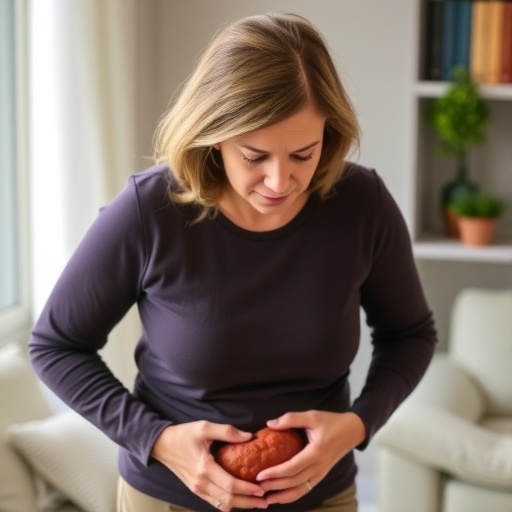A new compelling study sheds light on the often-overlooked impact of menopause on digestive health, revealing an extensive prevalence of gastrointestinal symptoms among perimenopausal and menopausal women. Despite affecting a vast majority, these symptoms frequently go undiagnosed and untreated, revealing a significant gap in clinical awareness and care strategies. This research will be unveiled at the 2025 Annual Meeting of The Menopause Society in Orlando, marking a pivotal moment in understanding the complex intersection between hormonal transitions and gut health.
The menopause transition encompasses profound hormonal changes, primarily fluctuations in estrogen and progesterone levels, which are known to affect numerous bodily systems. Among these, the gastrointestinal tract is particularly sensitive, yet digestive symptoms during this phase are commonly dismissed as mere byproducts of aging or misattributed to unrelated gastrointestinal conditions. The new research underscores that this oversight results in under-recognition of distressing gastrointestinal complaints, such as bloating, gastric pain, and altered bowel habits. These symptoms not only reduce quality of life but often remain unmanaged due to lack of targeted diagnosis and treatment.
Conducted in the United Kingdom, the study analyzed data from nearly 600 women aged between 44 and 73 years, a cohort spanning perimenopausal to postmenopausal stages. Intriguingly, an overwhelming 94% of participants reported digestive symptoms, with bloating affecting more than three-quarters of respondents. Additional prevalent symptoms included constipation, stomach pain, and acid reflux. However, despite the ubiquity of these issues, a mere one-third of women had received an official diagnosis of irritable bowel syndrome (IBS) or related gastrointestinal disorders, highlighting an alarming diagnostic gap.
The temporal relationship between symptom escalation and menopausal status was particularly striking. Over 82% of the women noted either onset or worsening of digestive disturbances coinciding with the perimenopausal or menopausal phases. Statistical analyses revealed significant correlations specifically between menopausal groups and frequent complaints of bloating and stomach pain. These findings emphasize that hormonal shifts profoundly exacerbate gastrointestinal symptomatology, creating a clinical profile distinct from IBS presentations in other populations.
Seeking medical consultation was reported by just over half of the study participants, yet more than half of these women expressed dissatisfaction with the level of care or treatment effectiveness they received. This dissatisfaction underscores the need for healthcare systems to better recognize and address menopause-related digestive health challenges. Most strikingly, nearly 90% of participants resorted to self-implemented coping mechanisms—ranging from modified diets and supplement use to stress reduction techniques—signifying a patient-driven attempt to fill the void left by inadequate professional support.
Daily or at least weekly persistence of symptoms affected over half of the women, with a substantial proportion reporting that the gastrointestinal distress had a consistent negative impact on their overall quality of life. This chronic symptom burden often exacerbates psychological stress and may complicate management of other menopausal symptoms, underscoring the interconnectedness of bodily systems during this transitional life phase. The study’s findings signal urgent clinical and research priorities to develop integrated care paradigms tailored to midlife women’s unique digestive health needs.
Beyond the direct symptomatology, the research invites a deeper exploration into the mechanistic pathways linking hormonal fluctuations to gastrointestinal function alterations. Estrogen receptors are present throughout the gastrointestinal tract, modulating motility, secretion, and visceral sensitivity. Declining estrogen levels may impair gut barrier integrity and alter the gut microbiome, potentially precipitating inflammation and dysbiosis. Understanding these pathophysiological processes is critical for advancing diagnostic precision and therapeutic innovation tailored for menopausal digestive disorders.
The study’s lead author, Nigel Denby, a registered dietitian, stressed that digestive health issues during midlife are frequently minimized or overlooked, despite their widespread prevalence and significant impact. He advocates for increased clinician awareness, targeted inquiry into gastrointestinal symptoms during menopause, and validation of women’s lived experiences. This approach could catalyze improved patient-provider communication and foster development of effective, individualized interventions to address this silent, yet pervasive, health burden.
Dr. Stephanie Faubion, medical director of The Menopause Society, highlighted the discrepancy in symptom recognition between classic menopause manifestations (such as hot flashes and mood fluctuations) and gastrointestinal complaints. She noted that digestive symptoms are insufficiently emphasized in both clinical practice and research, contributing to women’s unmet needs in this domain. Dr. Faubion underscores the importance of elevating digestive health on the menopause care agenda to ensure comprehensive symptom management.
The study’s implications extend beyond individual patient care, pressing for systemic improvements in healthcare professional education and research funding priorities. Expanding the evidence base through rigorous investigations, including mechanistic studies and clinical trials, will be essential to elucidate effective therapeutic strategies targeting the gut-menopause nexus. Multidisciplinary collaboration involving gastroenterologists, gynecologists, dietitians, and mental health professionals will be vital for holistic care models.
In summary, this groundbreaking research poignantly reveals that digestive health problems are a hidden but significant component of the menopause experience. With nearly universal symptom reporting and substantial impacts on quality of life, there is a critical need to bridge the gap between symptom burden and diagnosis, enhance treatment paradigms, and elevate clinical responsiveness. The 2025 Annual Meeting of The Menopause Society will present these findings in greater detail, aiming to galvanize a paradigm shift in recognizing and addressing gut health during menopause.
To learn more about the intersection of menopause and gastrointestinal health and to explore supportive resources, healthcare professionals and women navigating menopause are encouraged to visit menopause.org. This platform serves as a comprehensive resource hub, reflecting The Menopause Society’s commitment to advancing women’s health and empowering both patients and providers with evidence-based information.
Subject of Research: People
Article Title: Menopause and the Gut: Uncovering a Hidden Health Burden
News Publication Date: October 21, 2025
Web References: menopause.org
References: Study to be presented at the 2025 Annual Meeting of The Menopause Society
Keywords: Health and medicine




